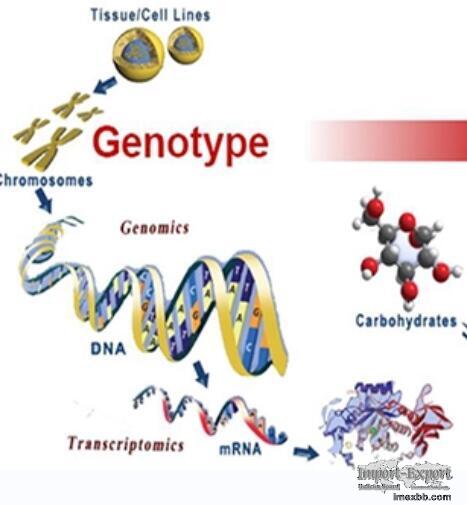 |
 |
Home > Offers to Sell > Construction & Real Estate > Construction Stone > Granite
| Contact: | metwarebio |
|---|---|
| Company: | Metware Biotechnology Co., Ltd |
| Building C2-3 No. 666 Gaoxin Avenue, East Lake New Technology Development Zone, Wuhan | |
| hubei 200333 | |
| China | |
| Phone: | 027-65520430 |
| E-Mail: | |
| Date/Time: | 1/2/24 8:40 GMT |
Resequencing+Metabolome
Home Metabolomics Services Multi-Omics Resequencing and Metabolomics
resequencing metabolome services
The types and quantities of metabolites vary greatly in different species and
tissues. The mGWAS (metabolome Genome-Wide Association Study) approach uses
population materials, based on resequencing genetic information and
metabolomics data to carry out genome-wide association analysis between genomic
variations and metabolite quantities.
Case Study: Genome-wide association analyses provide genetic and biochemical
insights into natural variation in rice metabolism (Chen et al., Nature
Genetics 2014)
Subspecies specific metabolites between two rice subspecies
Using 529 rice leaf materials, a total of 840 compounds were detected by
Widely-Targeted Metabolomics. Cluster analysis of these metabolites identified
C-glycosylated and malonylated flavonoids accumulated more in the O. indica,
while the O. japonica contained large amounts of phenolamides and arabidopyl
alcohol derivative compounds. These subspecies-specific metabolites reflect the
differentiation of O. indica and O. japonica.
SNP analysis and metabolite association of the rice population
Using NGS on the 529 materials, 6,428,770 SNPs were screened for further
analysis. Simple linear regression (LR) and linear mixed models (LMM) were used
for mGWAS analysis and a total of 2,947 major SNPs were identified,
corresponding to 634 loci in at least one population.
161 significant loci shown on the Manhattan plot correspond to flavonoids,
phenolic compounds, amino acids and their derivatives, terpenoids, nucleic
acids and their derivatives, and other known metabolites. In addition, there
are 195 loci corresponding to unknown metabolites.
Case Study
mGWAS assists with annotation of unknown metabolites
mGWAS facilitates the annotation of metabolites by associating unknown
metabolites with functionally relevant genes. For example, SNP sf1207801034 in
the NOMT gene encoding naringenin 7-O-methyltransferase correlated with mr1002
levels, suggesting that this metabolite may be sakuranetin. Subsequently, the
mr1002 metabolite was proven to be sakuranetin by comparing the retention time
and fragmentation pattern with the chemical standard of this compound. In this
study, GWAS was able to annotate 166 unknown metabolites.
Case Study
Biochemical and functional interpretation of GWAS results
In addition to providing insight into the genetic basis of metabolic changes,
mGWAS also provide insight into the biochemistry and function of underlying
pathways. We can examine previously unidentified candidate genes by (i) finding
genes or gene clusters associated with the relevant metabolic signatures
encoded by these loci; (ii) clustering candidate genes with homologous genes
with known functions; (iii) cross-reference genetic map results. We hope to
uncover candidate genes or SNPs valuable for plant physiological or human
nutrition.
For instance, trigonelline, an N-methyl conjugate of nicotinic acid, has long
been reported to regulate various processes, especially abiotic stress in
plants, but the enzyme that catalyzes niacin to trigonelline was unknown at the
time. Trigonelline levels were significantly correlated with SNP sf0235317720
on chromosome 2, which was in linkage disequilibrium with the Os02g57760 gene
encoding an O-methyltransferase protein, indicating that Os02g57760 encodes a
key methyltransferase that catalyzes trigonelline biosynthesis. When N-terminal
His-tagged Os02g57760 was expressed in E. coli BL-21, we were able to detect
niacin:N-methyltransferase activity in soluble protein extracts. Consistent
with the in vitro activity, overexpression of Os02g57760 in ZH11 (an O.
japonica cultivar with low trigonelline content) resulted in a greater
accumulation of trigonelline in the transgenic lines compared to control
plants, confirming that Os02g57760 catalyzes trigonelline biosynthesis.
From targeted assays of specific metabolites to global metabolite profiling,
Metware Biotechnology has developed services that can satisfy every project,
all the while keeping the most important in mind: data quality. Not sure which
services work for you? Contact us to speak with one of our specialists and let
us help you design a metabolome project suitable for your research and
development.
SOURCE: Import-Export Bulletin Board (https://www.imexbb.com/)
![]()
© 1996-2010 IMEXBB.com. All rights reserved.
|
|
|
